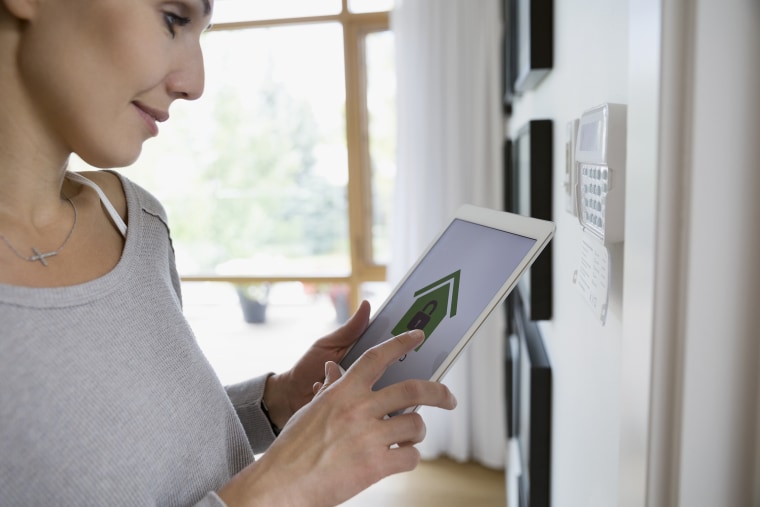4 Upgrades that Can Lower the Cost of Your Homeowners Insurance
 4 Upgrades that Can Lower the Cost of
4 Upgrades that Can Lower the Cost of
Your Homeowners Insurance
Opting for some voluntary upgrades not only reduces your risk, but it can also save you as much as 35 percent on your policy.

Home security upgrades like door sensors and centrally monitored systems can qualify you for protective device discounts.Hero Images / Getty Images
Homeowners insurance costs an average of $1,083 annually across the US — but that number varies widely from state to state. For example, annual premiums in Florida average $2,055, while policyholders in Oregon pay just $574.
It’s difficult to nail down exact policy pricing because multiple factors go into your specific calculation, says Angela Orbann, vice president of personal insurance products at Travelers Insurance. Which state you live in is a big one — coastal homes come with different risks than those located in the Midwest, for example — but your insurer will also consider the size, age and characteristics of your house, prior losses and features that qualify you for discounts or credits.
Insurance companies offer policy discounts in the form of credits or reduced premiums for home upgrades that could minimize the need to file a claim as well as the dollar amount paid out for claims that do come through. Basically, it costs insurers less to reduce premium prices than it does to pay for damages and losses.
Some of these home improvement projects are expensive upfront, which means it could take years for insurance discounts to match what you spend on the upgrade. However, reducing the cost of your insurance is just one of the advantages of making the investment. A new roof or storm-resistant windows, for example, could save you thousands of dollars in damages in the event of a hurricane or hailstorm, while home security can stop a burglar in his tracks.
“These devices are protection that will save you from the pain of a loss, so they’re good preventative measures in addition to making sure you have sufficient insurance coverage,” says Jenny Naughton, executive vice president at Chubb Personal Risk Services.
Here are four upgrades to consider — and how they’ll pay off over time.
HOME SECURITY
A home security system is one of the simplest upgrades homeowners can make to reduce both policy costs and the risk of loss due to burglary, accidents and storms. Home security generally falls under insurance companies’ protective device discounts and may include everything from door sensors and smoke alarms to centrally monitored systems that automatically notify emergency personnel if a problem arises.
“Homeowners can save around 10% on their policies for installing home security.”
Home security systems cost $685-$994 on average to install, and monitoring services range from $20 to $70 per month. There are a number of DIY, self-installation systems that won’t require a hefty installation fee, though you will pay for the cost of the equipment. You can also track some systems and devices yourself from your smartphone, but you’re likely to qualify for the largest discount with third-party monitoring.
Insurers report that homeowners can save around 10% on their policies for installing home security, which adds up to $108 annually based on average premium costs. Because monitoring is an ongoing monthly cost, you’re unlikely to recoup the total amount spent. However, the average loss due to burglary was $2,361 in 2016, which makes the upfront cost of home security sound a bit more appealing.
WATER SHUTOFF DEVICES
According to data from the Insurance Information Institute (III), water damage accounted for nearly 30% of losses in 2016, and the average loss between 2012 and 2016 totaled $9,633. Devices that cut off a home’s water supply when they detect damage to pipes, water lines and plumbing can prevent significant damage and save homeowners an average of 3% on their premiums, according to Trevor Chapman, a Farmers Insurance spokesman.
Water leak sensors are another category of protection. However, they merely detect moisture in places where it shouldn’t be, such as behind a washing machine or toilet, and don’t actively cut water flow. They’re useful but unlikely to qualify you for the same level of discount.
Water shutoff devices cost $174-$208, on average, to install. With an average annual discount of $32, it would take between[…]
– – – – – – –
Continue reading this article.
Don’t forget, The Portier Agency offers homeowner/mobile home/ renter’s /automobile / motorcycle / life / commercial / crop insurance.
Call or come by to get your quote!
 The Portier Agency, LLC
The Portier Agency, LLC
113 North Irwin Avenue
Ocilla, GA 31774
229-468-3444
portieragency@windstream.net